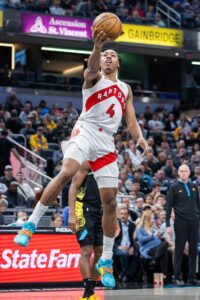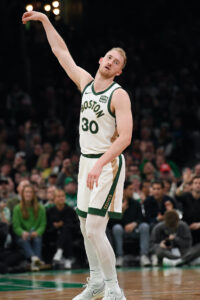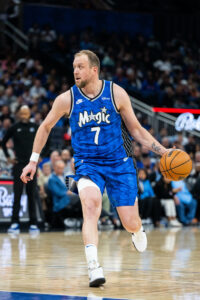With another regular season in the books, multiple teams around the NBA are making head coaching changes in advance of the 2024/25 campaign.
In the space below, we’ll provide regular updates on the head coaching searches for each club that has yet to give anyone the permanent title. Some of these searches could extend well into the offseason, so be sure to check back often for the latest updates.
You’ll be able to access this page anytime under the “Hoops Rumors Features” menu on the right sidebar on our desktop site, or on the “Features” page in our mobile menu.
Updated 11-6-24 (1:30pm CT)
Active Searches
None
Completed Searches
Brooklyn Nets
- New coach:
- Previous coach:
- Other finalists:
- Former NBA head coach Mike Budenholzer (story)
- Suns assistant Kevin Young (story)
- Also reportedly considered:
- Pelicans assistant James Borrego (story)
- Knicks assistant Johnnie Bryant (story)
- Nets interim head coach Kevin Ollie (story)
- Heat assistant Chris Quinn (story)
After parting ways with former head coach Jacque Vaughn in February, the Nets launched their head coaching search well before the regular season ended, though they did so in relative secrecy. While they reportedly cast a wide net, considering – and interviewing – many candidates, there were few leaks until word broke on April 13 that it was down to Fernandez, Budenholzer, and Young.
With Budenholzer’s contract demands said to be quite high in terms of both years and dollars, the Nets turned to a first-time NBA head coach, picking Fernandez over Young. While Fernandez has never led an NBA team, he’s not entirely without head coaching experience — he coached the Canton Charge in the G League from 2014-16 and is the current leader of the Canadian national team, which won bronze at the 2023 FIBA World Cup.
Nets general manager Sean Marks has gone through several head coaches during his tenure in Brooklyn, but this was his most exhaustive search process since he hired Kenny Atkinson back in 2016. Atkinson took over a rebuilding club and got them back to the postseason in his third season. With more foundational pieces in place this time around, the Nets are hoping Fernandez can turn things around even faster.
Charlotte Hornets
- New coach:
- Previous coach:
- Reportedly interviewed:
- Nuggets assistant David Adelman (story)
- King assistant Jordi Fernandez (interviewed before being hired by Nets)
- Kings’ G League head coach Lindsey Harding (story)
- Rockets assistant Royal Ivey (story)
- Clippers assistant Jay Larranaga (story)
- Lakers assistant Jordan Ott (story)
- ESPN analyst J.J. Redick (story)
- Former Vanderbilt coach Jerry Stackhouse (story)
- Suns assistant Kevin Young (interviewed before being hired by BYU)
- Also reportedly considered:
- Heat assistant Chris Quinn (story)
- Jazz assistant Lamar Skeeter (story)
The Hornets were able to get a head start on their head coaching search when Clifford announced during the first week of April that he would be stepping down from his role at season’s end. The team has changed ownership and revamped its front office since Clifford was hired in 2022, so this was new management’s first opportunity to hire a head coach.
The Hornets ultimately chose a familiar face. After being mentioned most frequently as the frontrunner for the job, Celtics assistant Charles Lee agreed to a four-year deal to become Charlotte’s new head coach. Lee, who has received consideration from several teams seeking head coaches in recent years, was an assistant with the Hawks from 2014-18. New Hornets head of basketball operations Jeff Peterson was in Atlanta’s front office at the time, while co-owner Rick Schnall was a minority stakeholder in the Hawks beginning in 2015.
Charlotte, which is building around young players like LaMelo Ball and Brandon Miller, was said to be seeking a first-time head coach who specializes in player development to lead its young squad. Lee, 39, fits that bill and also has some championship experience under his belt, having served as an assistant with the Bucks during their 2021 championship run.
Cleveland Cavaliers
- New coach:
- Previous coach:
- Reportedly interviewed:
- Nuggets assistant David Adelman (story)
- Pelicans assistant James Borrego (story)
- Knicks assistant Johnnie Bryant (story)
- Timberwolves assistant Micah Nori (story)
- Heat assistant Chris Quinn (story)
- Also reportedly considered:
- Mavericks assistant Alex Jensen (story)
- Bucks assistant Dave Joerger (story)
- Former NBA head coach Terry Stotts (story)
Bickerstaff led the Cavaliers to a 48-win season and the franchise’s first playoff series win without LeBron James since 1993. It wasn’t enough to save his job though, with a report following Cleveland’s elimination from the postseason indicating that Donovan Mitchell and other Cavs players didn’t necessarily have full confidence in the veteran coach.
The Cavaliers were said to be seeking a “fresh approach” as they sought to hire a new head coach capable of taking the team deeper into the postseason. Atkinson and Borrego were each identified as the presumed favorite during the process, and it sounded as if Cleveland’s decision came down to the two former head coaches, with Atkinson winning out and receiving a five-year contract.
Atkinson, who previously coached Cavaliers like Jarrett Allen and Caris LeVert in Brooklyn, was the choice in part because Cleveland believes he’s the best candidate to bring out the best in rising young star Evan Mobley. He’ll get that opportunity after spending the past three years as Steve Kerr‘s top assistant in Golden State.
Detroit Pistons
- New coach:
- Previous coach:
- Reportedly interviewed:
- Timberwolves assistant Micah Nori (story)
- Mavericks assistant Sean Sweeney (story)
- Also reportedly considered:
- Former Pistons assistant Jerome Allen (story)
- Pelicans assistant James Borrego (withdrew from consideration)
- Knicks assistant Johnnie Bryant (story)
- Heat assistant Chris Quinn (story)
- Former Nets assistant Will Weaver (story)
It was just one year ago that Williams signed a six-year, $78.5MM deal that was the most lucrative contract for a head coach in NBA history. After a dismal season that saw the Pistons go 14-68 and set a new single-season record for longest losing streak (28 games), Detroit replaced Troy Weaver with Trajan Langdon as the new head of basketball operations, then decided on a fresh start on the sidelines as well, eating the estimated $65MM remaining on Williams’ contract.
As last season’s record shows, the Pistons aren’t close to contending, so they didn’t need to target a veteran coach with championship experience. While they’d like to take a step forward sooner rather than later, player development remains the priority in Detroit.
That made Bickerstaff a logical choice. While he was let go in Cleveland in part due to the team’s modest postseason results over the last two years, he played a key role in the developmental process that made Darius Garland and Evan Mobley into an All-Star guard and All-Defensive big man, respectively, and in turning the Cavaliers from a lottery team into a solid playoff club.
Bickerstaff reportedly received a five-year deal from the Pistons that includes four guaranteed seasons.
Los Angeles Lakers
- New coach:
- Previous coach:
- Reportedly interviewed:
- Nuggets assistant David Adelman (story)
- Pelicans assistant James Borrego (story)
- Celtics assistant Sam Cassell (story)
- Timberwolves assistant Micah Nori (story)
- Heat assistant Chris Quinn (story)
- Also reportedly considered:
- Warriors assistant Kenny Atkinson (story)
- Former NBA head coach Mike Budenholzer (hired by Suns)
- UConn head coach Dan Hurley (story)
- Celtics assistant Charles Lee (hired by Hornets)
- Clippers head coach Tyronn Lue (extended by Clippers)
- Mavericks assistant Sean Sweeney (story)
Shortly after the Lakers’ season ended, a pair of reports from ESPN and The Athletic classified Ham’s job as being in serious danger and pointed to several specific reasons why. It was clear at that point that Ham wasn’t going to be back in his role as head coach, but the team took three more days to make it official.
Seeking a new head coach to lead a team they still feel is capable of contending, the Lakers reportedly had serious interest in the guy coaching their cross-town rivals. However, the Clippers were said to be highly motivated to retain Lue and backed that up by signing him to a long-term extension.
With Lue off the table, the Lakers cast a wide net and took their time as they consider options ranging from former head coaches (such as Atkinson and Borrego) to veteran assistants (like Adelman, Cassell, and Quinn, among others) to total newcomers (Redick). They reportedly want a “grinder” capable of challenging Lakers players and holding them accountable.
The search took an unexpected turn when a report stated that the Lakers’ top target was actually Hurley, whom L.A. attempted to lure away from the college ranks with a six-year, $70MM deal. However, Hurley passed on that offer in favor of seeking a third consecutive national title at UConn, sending the Lakers back to the drawing board. They ultimately circled back to Redick, who has no coaching experience at the NBA level, agreeing to a four-year, $32MM deal with the ESPN analyst.
Although Redick is LeBron James‘ podcast co-host, reports stated that the Lakers star wasn’t involved in the search and that management was infatuated by Redick’s potential as a coach, given his “basketball IQ” and his “ability to connect with players.” The goal will be to surround him with an experienced coaching staff to help accelerate his learning curve.
Phoenix Suns
- New coach:
- Previous coach:
In his first season as the head coach in Phoenix, Vogel led the Suns to a 49-33 record and a top-six seed in a competitive Western Conference. However, the club was quickly eliminated from the playoffs, failing to win a single game against the Timberwolves in the first round.
With little flexibility to make major moves affecting their roster this offseason, the Suns decided to make a head coaching change, dismissing Vogel just one season into the five-year, $31MM contract he signed with the franchise last spring. He’ll be replaced by Budenholzer, another veteran coach with a championship on his résumé.
Word broke that the Suns had decided on Budenholzer less than 24 hours after Vogel was fired, so it’s clear the team had a specific candidate in mind and didn’t feel the need to conduct a lengthy search. There was no indication that Phoenix seriously considered anyone else besides the former Bucks head coach, who reportedly agreed to a five-year contract worth in excess of $50MM.
Washington Wizards
- New coach:
- Previous coach:
- Brian Keefe (interim); replaced Wes Unseld Jr. during season (story)
- Reportedly interviewed:
- Spurs assistant Mitch Johnson (story)
- Also reportedly considered:
- Warriors assistant Kenny Atkinson (story)
- Rockets assistant Royal Ivey (story)
- Heat assistant Chris Quinn (story)
- Mavericks assistant Sean Sweeney (story)
The Wizards technically made their head coaching change in January, when they removed Unseld from his position and had him transition into a front office role. Keefe was promoted from assistant coach to head coach at that time and was ultimately named Unseld’s permanent replacement in May.
It’s a little surprising that Washington’s new front office, led by president Michael Winger and general manager Will Dawkins, ultimately ended up landing on the in-house option who posted an 8-31 record after taking over for Unseld. But Keefe improved the defense in the second half and is known as a player development specialist, which was the priority for a rebuilding Wizards club.
It’s unclear whether any other candidates received serious consideration for the job. While a May 10 story indicated that interviews would begin soon, there were few leaks throughout the process and little indication of which other contenders received interviews.
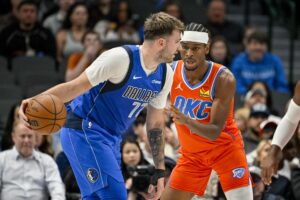 The Mavericks finished the regular season as the No. 5 seed in the Western Conference, but they weren’t a typical five seed. Dallas came into its own during the second half of the season, particularly after acquiring P.J. Washington and Daniel Gafford at the trade deadline to solidify the rotation.
The Mavericks finished the regular season as the No. 5 seed in the Western Conference, but they weren’t a typical five seed. Dallas came into its own during the second half of the season, particularly after acquiring P.J. Washington and Daniel Gafford at the trade deadline to solidify the rotation. The reason Towns’ maximum salary is a few million shy of VanVleet’s is that those league-wide maximum salary figures only apply to the first year of a multiyear contract.
The reason Towns’ maximum salary is a few million shy of VanVleet’s is that those league-wide maximum salary figures only apply to the first year of a multiyear contract.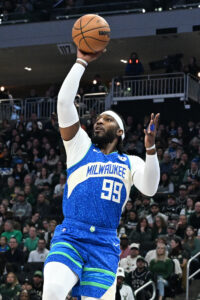 For example, when the Bucks
For example, when the Bucks 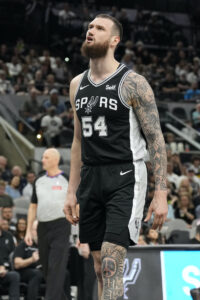 For instance, after earning $2,019,706 this season, Spurs big man
For instance, after earning $2,019,706 this season, Spurs big man 